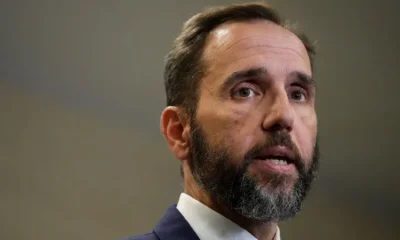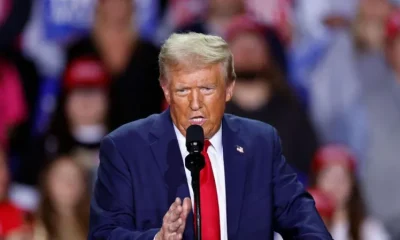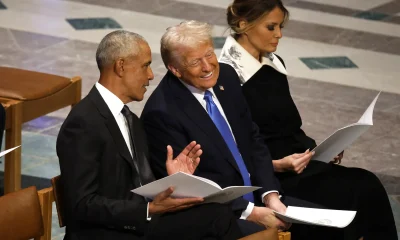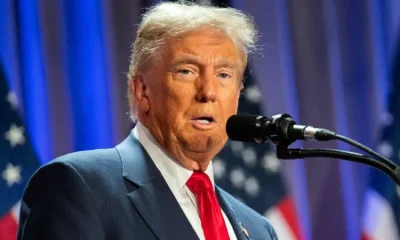International
Trump Moves to Stall Election Trial as Judge Sets Timeline
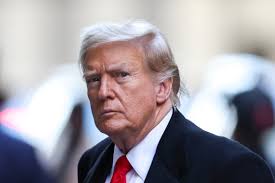
Former President Donald Trump and special counsel Jack Smith are at odds over how to proceed with the election subversion case in Washington, DC.
According to a status report filed late Friday, neither side is in a hurry to go to trial before the November presidential election or even by the end of the year.
Smith hasn’t proposed firm dates for the next phase, while Trump suggests a schedule that could extend pre-trial disputes into early 2025, with the possibility of proceedings stretching into fall 2025.
This sets the stage for a potentially contentious hearing next week in DC’s federal courthouse, where Judge Tanya Chutkan will decide the case’s timeline.
It’s the first hearing since the Supreme Court ruled that Trump has some immunity in the election subversion prosecution.
This filing comes shortly after Smith adjusted his indictment to align with the Supreme Court’s conservative majority ruling.
The parties disagree on the order of operations for the case. Smith wants Judge Chutkan to first address the Supreme Court’s ruling on presidential immunity, suggesting she handle this alongside other pre-trial issues Trump plans to raise.
Trump, however, insists on challenging the legality of Smith’s appointment before moving to the immunity dispute.
He also plans to seek dismissal of the case, claiming that the grand jury that approved the new indictment considered “immunized evidence” related to presidential conduct protected by the Supreme Court’s ruling.
Trump’s legal team previewed other potential challenges to the charges, arguing each issue should be treated separately, which would prolong the case timeline.
One possible challenge could target the special counsel’s use of allegations related to Vice President Pence.
Trump’s attorneys are also considering a challenge based on a Supreme Court ruling that limited how obstruction charges were used against January 6, 2021, defendants.
“Fully considering, researching, briefing, and resolving each of these potential motions will take considerable time and resources,” Trump’s attorneys stated.
EDITORS PICK:
- Lagos Fire Outbreak: Sanwo-Olu Compensates Victims
- Lagos Govt Arrests 25 Suspected Hoodlums Over Attacks On Motorists
- Lagos Govt Nabs 12 Miscreants For Constituting Nuisance
“Our proposed calendar accounts for this, yet still moves the case forward expeditiously.”
A significant disagreement between Smith and Trump is over how to resolve the question of whether presidential immunity covers any aspects of the new indictment.
Smith wants to start with an opening brief to explain why the new indictment complies with the Supreme Court’s ruling, allowing Trump to respond and then following up with a reply.
“The Government is prepared to file its opening immunity brief promptly at any time the Court deems appropriate,” the prosecutors wrote, leaving it to Judge Chutkan to decide how quickly to move on the issue.
Trump opposes this approach, proposing a much longer process. He wants to file the first brief challenging the indictment on immunity grounds and argues he’s entitled to seek additional discovery from the government to inform that fight.
His proposed timeline suggests any immunity-related discovery disputes wouldn’t be resolved until late January at the earliest.
Before the new indictment was issued Wednesday, prosecutors spent eight weeks reassessing the evidence and allegations they could still include after the Supreme Court’s ruling.
The revised indictment excludes allegations that Trump tried to use the Justice Department to reverse the 2020 election results and removes evidence from conversations Trump had with his presidential advisers.
Despite this, Smith’s team retained all four charges against Trump, including conspiracy and obstruction, to which Trump has pleaded not guilty.
Before Trump successfully sought the Supreme Court’s intervention, the federal election interference case was moving quickly, with a trial once set for March.
As in other criminal cases he faces, Trump’s strategy appears focused on delay. He’s also accused prosecutors of trying to interfere with the 2024 election, calling the new indictment a “direct assault on Democracy!” in a Tuesday post on Truth Social.
While Justice Department policy discourages major investigative steps within 60 days of an election, this isn’t seen as a hard-and-fast rule.
In the classified documents case in Florida, a prosecutor said in March that the policy doesn’t apply to already-charged cases.
CLICK TO WATCH OUR VIDEO OF THE WEEK
Advertise or Publish a Story on EkoHot Blog:
Kindly contact us at [email protected]. Breaking stories should be sent to the above email and substantiated with pictorial evidence.
Citizen journalists will receive a token as data incentive.
Call or Whatsapp: 0803 561 7233, 0703 414 5611


